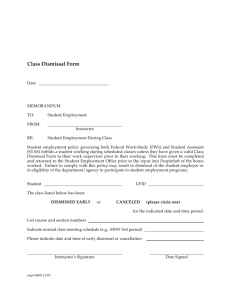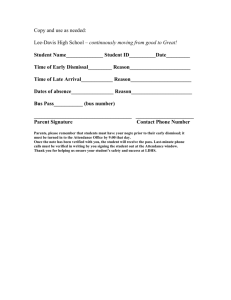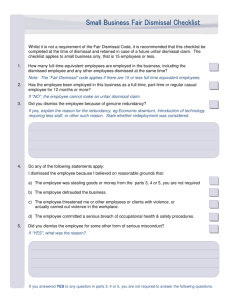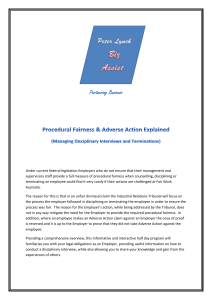Important Changes to Small Business Fair Dismissal Code
advertisement
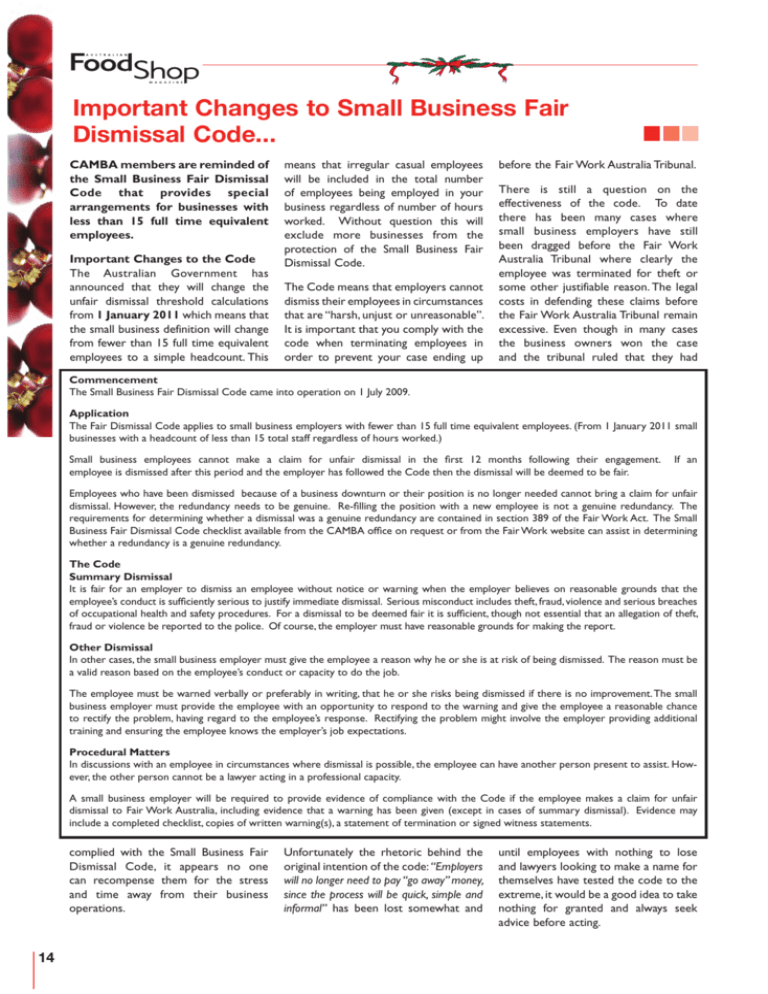
M A G A Z I N E Important Changes to Small Business Fair Dismissal Code... CAMBA members are reminded of the Small Business Fair Dismissal Code that provides special arrangements for businesses with less than 15 full time equivalent employees. Important Changes to the Code The Australian Government has announced that they will change the unfair dismissal threshold calculations from 1 January 2011 which means that the small business definition will change from fewer than 15 full time equivalent employees to a simple headcount. This means that irregular casual employees will be included in the total number of employees being employed in your business regardless of number of hours worked. Without question this will exclude more businesses from the protection of the Small Business Fair Dismissal Code. The Code means that employers cannot dismiss their employees in circumstances that are “harsh, unjust or unreasonable”. It is important that you comply with the code when terminating employees in order to prevent your case ending up before the Fair Work Australia Tribunal. There is still a question on the effectiveness of the code. To date there has been many cases where small business employers have still been dragged before the Fair Work Australia Tribunal where clearly the employee was terminated for theft or some other justifiable reason. The legal costs in defending these claims before the Fair Work Australia Tribunal remain excessive. Even though in many cases the business owners won the case and the tribunal ruled that they had Commencement The Small Business Fair Dismissal Code came into operation on 1 July 2009. Application The Fair Dismissal Code applies to small business employers with fewer than 15 full time equivalent employees. (From 1 January 2011 small businesses with a headcount of less than 15 total staff regardless of hours worked.) Small business employees cannot make a claim for unfair dismissal in the first 12 months following their engagement. employee is dismissed after this period and the employer has followed the Code then the dismissal will be deemed to be fair. If an Employees who have been dismissed because of a business downturn or their position is no longer needed cannot bring a claim for unfair dismissal. However, the redundancy needs to be genuine. Re-filling the position with a new employee is not a genuine redundancy. The requirements for determining whether a dismissal was a genuine redundancy are contained in section 389 of the Fair Work Act. The Small Business Fair Dismissal Code checklist available from the CAMBA office on request or from the Fair Work website can assist in determining whether a redundancy is a genuine redundancy. The Code Summary Dismissal It is fair for an employer to dismiss an employee without notice or warning when the employer believes on reasonable grounds that the employee’s conduct is sufficiently serious to justify immediate dismissal. Serious misconduct includes theft, fraud, violence and serious breaches of occupational health and safety procedures. For a dismissal to be deemed fair it is sufficient, though not essential that an allegation of theft, fraud or violence be reported to the police. Of course, the employer must have reasonable grounds for making the report. Other Dismissal In other cases, the small business employer must give the employee a reason why he or she is at risk of being dismissed. The reason must be a valid reason based on the employee’s conduct or capacity to do the job. The employee must be warned verbally or preferably in writing, that he or she risks being dismissed if there is no improvement. The small business employer must provide the employee with an opportunity to respond to the warning and give the employee a reasonable chance to rectify the problem, having regard to the employee’s response. Rectifying the problem might involve the employer providing additional training and ensuring the employee knows the employer’s job expectations. Procedural Matters In discussions with an employee in circumstances where dismissal is possible, the employee can have another person present to assist. However, the other person cannot be a lawyer acting in a professional capacity. A small business employer will be required to provide evidence of compliance with the Code if the employee makes a claim for unfair dismissal to Fair Work Australia, including evidence that a warning has been given (except in cases of summary dismissal). Evidence may include a completed checklist, copies of written warning(s), a statement of termination or signed witness statements. complied with the Small Business Fair Dismissal Code, it appears no one can recompense them for the stress and time away from their business operations. 14 Unfortunately the rhetoric behind the original intention of the code: ‘‘Employers will no longer need to pay ‘‘go away’’ money, since the process will be quick, simple and informal’’ has been lost somewhat and until employees with nothing to lose and lawyers looking to make a name for themselves have tested the code to the extreme, it would be a good idea to take nothing for granted and always seek advice before acting.
